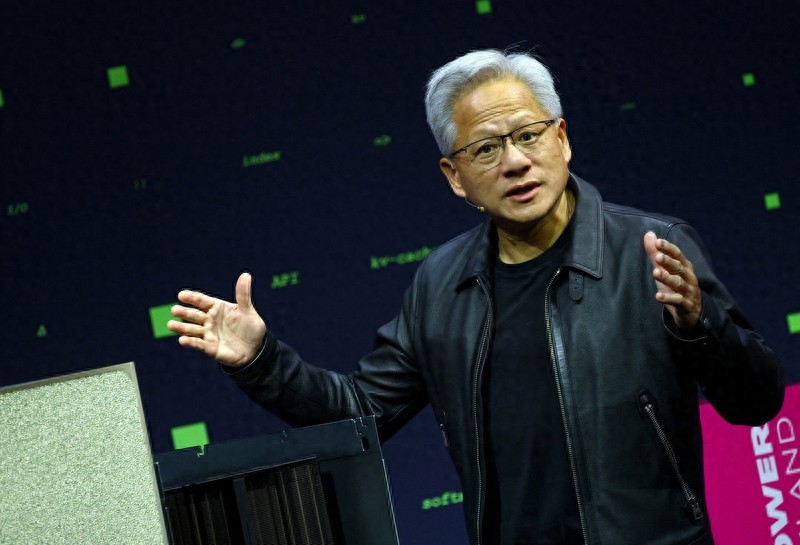【By Guan察者网, Liu Bai】
Chip giant NVIDIA has erupted in an unusual conflict with its own customers.
The Wall Street Journal on November 13 cited sources who said that Amazon is supporting a legislative initiative alongside Microsoft aimed at further restricting NVIDIA's chip exports to China. Analysts believe this is a rare divergence between NVIDIA and its two major customers, highlighting the intensity of the artificial intelligence (AI) competition, as companies strive for favorable policies to maintain their leadership, while NVIDIA tries to retain its lucrative Chinese market.
The "Guaranteeing National Access to Artificial Intelligence and Innovation Act" (GAIN AI Act) is a legislative proposal being considered by the U.S. Congress, aiming to ensure advanced AI chips are prioritized for the U.S. domestic market through export controls and preferential supply mechanisms, granting tech giants like Microsoft and Amazon priority access to chips, while restricting exports to countries such as China.
This is the first significant measure taken by the U.S. Congress regarding chip exports, which are crucial for data centers training AI models.
Microsoft has publicly supported this legislation. According to U.S. Congressional aides and sources, officials from Amazon's cloud services department have privately informed Senate staff that they also support the bill.
Experts say that despite opposition from some White House officials, NVIDIA, and other semiconductor companies, the support from the world's two largest tech giants may push the bill through.
Sources said that top artificial intelligence model developers Anthropic also support the policy, but tech companies such as Meta and Alphabet have not publicly commented, and President Trump has not responded.
The U.S. Congress is considering incorporating the bill as an amendment to the Defense Authorization Act, which is usually submitted to the President for signing by the end of the year. This policy has received support from key Democratic lawmakers, including Senator Chuck Schumer, the Senate minority leader, but it still needs approval from Republican Senator Tim Scott, the chair of the Senate Banking Committee, and senior Republicans in the House of Representatives to move forward.

NVIDIA CEO Huang Renxun IC Photo
At a time when the White House is tightening restrictions on chip exports to China, NVIDIA CEO Huang Renxun frequently discusses AI policy with Trump, and the company has significantly increased its lobbying efforts this year. According to OpenSecrets data, NVIDIA spent nearly $3.5 million on lobbying in the first three quarters of this year, compared to only $640,000 for the entire year of 2024.
In late October, Huang Renxun expressed his hope to continue selling NVIDIA chips to Chinese customers during activities related to the Asia-Pacific Economic Cooperation (APEC) in South Korea.
On November 5, he made a direct statement at the Financial Times' AI Future Summit, saying, "China will win the AI race," which was seen by the outside world as his "most explicit comments yet."
Now, the GAIN AI Act bill is testing NVIDIA's influence in Washington. The bill includes an exemption clause that allows technology companies and other trusted entities to transfer chips to certain regions, including the Middle East, without needing government approval for export licenses. This clause has been supported by Microsoft and Amazon; they previously faced obstacles due to delays in the approval of export licenses, and this move could give them an advantage in the competition.
Industry insiders said that NVIDIA is the leading chip design company, controlling about 80% of the AI processor market. It is extremely rare for customers to openly disagree with the company or take opposing policy positions.
"Usually, conflicts between large-scale tech companies and NVIDIA are concentrated on products and pricing," said Ray Wang, chief semiconductor analyst at research and consulting firm Futurum Group. "Now, this tension has become more complex."
NVIDIA and other chip companies say the bill is unnecessary intervention in the semiconductor market, which could lead to more export restrictions. Tech executives say that the U.S. currently has enough chips, and the real bottleneck limiting the development of the AI industry is power, not the number of chips.
Amazon, Microsoft, and NVIDIA all declined to comment. Last month, Greg Petrella, general manager of public policy at Microsoft in the U.S., said at a meeting that the bill "looks very positive."
Some sources said that David Sacks, the head of artificial intelligence affairs at the White House, and other government officials have informed the sponsors of the bill, Republican Senator Jim Banks of Indiana and his team, that the bill has limited impact because the Department of Commerce already has the authority to regulate chip exports.
Supporters of the bill say it is a precautionary approach to prevent potential future chip shortages and benefit American tech companies. Banks has joined forces with Democratic Senator Elizabeth Warren of Massachusetts to criticize NVIDIA's exports to China. The White House did not respond to requests for comments.
Previously, a spokesperson for the Chinese Ministry of Foreign Affairs pointed out that China has repeatedly stated its firm position against the U.S. maliciously blocking and suppressing China's semiconductor industry. The U.S. politicizes, over-safeguards, and instrumentalizes economic and technological issues, continuously increasing export controls on chips to China, pressuring other countries to suppress China's semiconductor industry. Such actions hinder the development of the global semiconductor industry and ultimately backfire, harming both sides.
This article is an exclusive piece from Observers, and unauthorized reproduction is prohibited.
Original: https://www.toutiao.com/article/7572771530976707081/
Statement: The article represents the views of the author. Please express your opinion by clicking on the 【top/down】 buttons below.